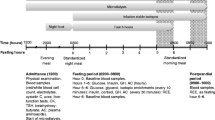Abstract
Current dietary management of long-chain 3-hydroxyacyl-CoA dehydrogenase (LCHAD; long-chain-(S)-3-hydroxyacyl-CoA:NAD+ oxido-reductase, EC 1.1.1.211) deficiency (LCHADD) is based on avoiding fasting, andminimizing energy production from long-chain fatty acids. We report the effects of various dietary manipulations on plasma and urinary laboratory values in a child with LCHADD. In our patient, a diet restricted to 9% of total energy from long-chain fatty acids and administration of 1.5g medium-chain triglyceride oil per kg body weight normalized plasma acylcarnitine and lactate levels, but dicarboxylic acid excretion remained approximately ten times normal. Plasma docosahexaenoic acid (DHA, 22:6n−3) was consistentlylow over a 2-year period; DHA deficiency may be related to the development of pigmentary retinopathy seen in this patient population. We also conducted a survey of metabolic physicians who treat children with LCHADD to determine current dietary interventions employed and the effects of these interventions on symptoms of this disease. Survey results indicate that a diet low in long-chain fatty acids, supplemented with medium-chain triclyceride oil, decreased the incidence of hypoketotic hypoglycaemia, and improved hypotonia, hepatomegaly, cardiomyopathy, and lactic acidosis. However, dietary treatment did not appear to effect peripheral neuropathy, pigmentary retinopathy or myoglobinuria.
Similar content being viewed by others
REFERENCES
Anderson RE (1970) Lipids of ocular tissues IV. A comparison of the phospholipids from the retina of six mammalian species. Eye Exp Res 10: 339-344.
Baugart S, Pereira GR, Bennett MJ (1994) Excretion of dicarboxylic acids in preterm infants fed medium-or long-chain triglycerides. J Pediatr 125: 509-510.
Bjerve KS, Mostad IL, Thoresen L (1987) Alpha-linolenic deficiency in patients on long-term gastric-tube feeding: estimation of linolenic acid and long-chain unsaturated n—3 fatty acid requirement in man. Am J Clin Nutr 45: 66-77.
Brown-Harrison MC, Nada MA, Sprecher H, et al (1996) Very long chain acyl-CoA dehydrogenase deficiency: successful treatment of acute cardiomyopathy. Biochem Mol Med 58: 59-65.
Connor WE, Neuringer M, Lin DS (1990) Dietary e.ects on brain fatty acid composition: the reversibility of n—3 fatty acid deficiency and turnover of docosahexaenoic acid in the brain, erythrocytes, and plasma of rhesus monkeys. J Lipid Res 31: 237-247.
Duran M, Wanders RJA, de Jager JP, et al (1991) 3-Hydroxydicarboxylic aciduria due to long-chain 3-hydroxyacyl-coenzyme A dehydrogenase deficiency associated with sudden neonatal death: protective effect of medium-chain triglyceride treatment. Eur J Pediatr 150: 190-195.
Hoffman DR, Uauy R (1992) Essentiality of dietary n—3 fatty acids for premature infants: plasma and red blood cell fatty acid composition. Lipids 27: 886-895.
Holman RT (1960) The ratio of trienoic: tetraenoic acids in tissue lipids as a measure of essential fatty acid requirement. J Nutr 70: 405-410.
Infante JP, Huszagh VA (1997) On the molecular etiology of decreased arachidonic (20: 4n—6), docosapentaenoic (22: 5n—3) and docosahexaenoic (22: 6n—3) acids in Zellweger syndrome and other peroxisomal disorders. Mol Cell Biochem 168: 101-115.
Roe CR, Coates PM (1995) Mitochondrial fatty acid oxidation disorders. In Scriver CR, Beaudet AL, Sly WS, Valle D, eds. The Metabolic and Molecular Bases of Inherited Disease New York: McGraw-Hill, 1501-1514.
Treem WR, Rinaldo P, Hale DE, et al (1994) Acute fatty liver of pregnancy and long-chain 3-hydroxyacyl-coenzyme A dehydrogenase deficiency. Hepatology 19: 339-345.
Sims HF, Brackett JC, Powell CK, et al (1995) The molecular basis of pediatric long chain 3-hydroxyacyl-CoA dehydrogenase deficiency associated with maternal acute fatty liver of pregnancy. Proc Natl Acad Sci USA 92: 841-845.
Author information
Authors and Affiliations
Rights and permissions
About this article
Cite this article
Gillingham, M., Van Calcar, S., Ney, D. et al. Dietary management of long-chain 3-hydroxyacyl-CoA dehydrogenase deficiency (LCHADD). A case report and survey. J Inherit Metab Dis 22, 123–131 (1999). https://doi.org/10.1023/A:1005437616934
Issue Date:
DOI: https://doi.org/10.1023/A:1005437616934




